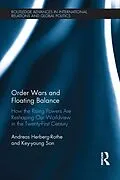This book is a synthesis of two separate bodies of thoughts, from Western and East Asian ideas and philosophies respectively. The authors deploy the major ideas of key Western and East Asian thinkers to shed a new light on their usefulness in understanding the transition of global order. They locate new ideas to overcome the contradictions of the late modern world and provide some ideational building blocks of a new global order. The new concepts proposed are: recognition between the great civilizations; a harmony and floating balance between and within contrasts-individual versus community, freedom versus equality-;and mediation between friends and foes.
Vorwort
Energy use is one of the most important issues of our age. This new series looks at different sources of power that are in use today
Autorentext
Andreas Herberg-Rothe is Senior Lecturer at Fulda University of Applied Sciences, Germany.
Key-young Son is Humanities Korea Professor at the Asiatic Research Institute, Korea University
Zusammenfassung
A sense of order has irreversibly retreated at the turn of the twenty-first century with the rise of such ancient civilizations as China and India and the militant resurgence of Islamic groups. The United States and like-minded states want to maintain the once-dominant international and global order buttressed by a set of mainly Western value systems and institutions. Nevertheless, challengers have sought to redraw the international and global order according to their own ideas and preferences, while selectively accommodating and taking advantage of the established order. Because of this, the entire world is teetering on the brink of an order war.This book is a synthesis of two separate bodies of thoughts, from Western and East Asian ideas and philosophies respectively. The authors deploy the major ideas of key Western and East Asian thinkers to shed a new light on their usefulness in understanding the transition of global order. They locate new ideas to overcome the contradictions of the late modern world and provide some ideational building blocks of a new global order. The new concepts proposed are: recognition between the great civilizations; a harmony and floating balance between and within contrasts-individual versus community, freedom versus equality-;and mediation between friends and foes. As the former Israeli Prime Minister Yitzhak Rabin put it, "e;you don't need to make peace with your friends, you have to make peace with your foes."e; The values of the West as well as that of the East cannot survive in a globalized world by taking them as absolute, but only by balancing them to those of the other great civilizations of the world.
Inhalt
Preface
Prologue: The Birth Pains of a New Global Order
Part 1: The Order War
1.The Order Wars in the Twenty-First Century
2.Between Lyotard and Hegel: Beyond Kant and the Binary Logic
3.The End of Western Modernity?
Part 2: Floating Balance
4.Clausewitz's 'Wondrous Trinity' and Floating Balance
5.Clausewitz, Polarity, and a Different Dialectics: A New Beginning
Part 3: Harmony
6.Harmony between Freedom and Equality
7.Confucian Harmony and East Asia's Mega-Discourses for Governance
Part 4: Recognition
8.Marx's Reversal of Hegel
9.Between Clausewitz and Hegel: Revitalizing the Struggle for Recognition
10.Between Carl Schmitt and Hannah Arendt: Mediation between Friends and Foes
Epilogue: Sharing Power in a New Global Order
